This is our regular round up of stories of progress from around the world. If you'd like to join the 50,000 people who get this in their inbox every week, you can subscribe for free below.
Good news for people
It might seem strange to talk about hope right now, at a time when the world is facing an array of complex crises from conflicts to climate change, and when the media headlines seem only to bring bad news. But amidst all this darkness and negativity, there is indeed hope and there is progress. Excellencies, I am here to tell you that, thanks to the tenacity and generosity of everyone in this room, we finally have the momentum to put child malnutrition behind us once and for all.
Since the year 2000, stunting in children under 5 years of age has declined by one-third, and today, there are 60 million fewer undernourished children. Meanwhile, the number of children screened and treated for wasting has also increased. In 2022, for example, more than 182 million children under five were reached with services for the early prevention, detection and treatment of child wasting, up from 154 million the year before. But we still have work to do.
Omar Abdi, Deputy Executive Director, UNICEF
Global Food Security Summit, 20th November 2023
Gapminder, the Swedish foundation created by Hans Rosling, has just done a big refresh on a bunch of its data, including extreme poverty. Two decades ago, a quarter of the world's population lived in extreme poverty. That fell to 8.3% by 2022. The pandemic caused setbacks, but it didn’t change the fact that life has continually improved for most people in the world in this century.
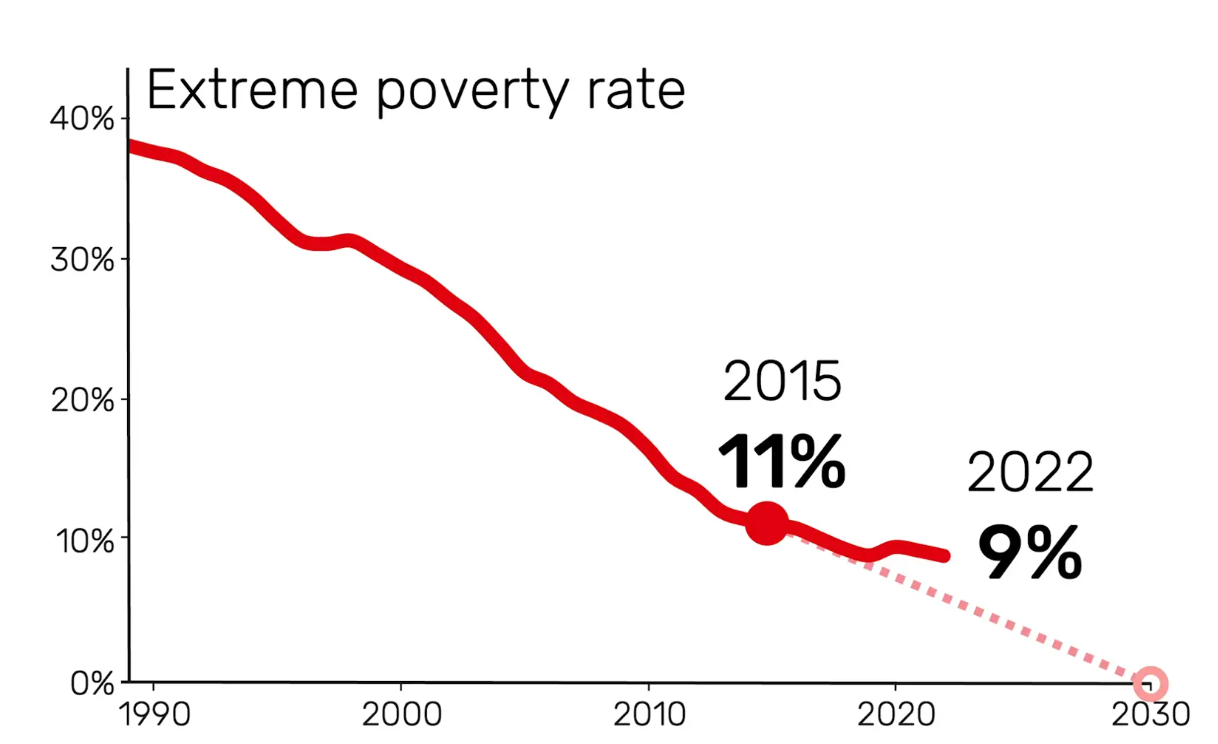
More than 330,000 doses of the Mosquirix malaria vaccine arrived last week in Cameroon, and an additional 1.7 million doses will arrive in Burkina Faso, Liberia, Niger, and Sierra Leone in the coming weeks, signalling that malaria vaccination is moving out of its pilot phase, laying the groundwork for these countries to begin vaccinations in the first quarter of next year. WHO
Tajikistan has experienced a significant improvement in living standards over the past two decades, with its poverty rate falling from 32% in 2009 to 13.4% in 2022. The COVID-19 pandemic was a significant shock, but it also strengthened the country’s intensive care units, sanitary and epidemiological services, laboratory capacity, and digitalisation of its health systems. World Bank
Fewer Filipino families considered themselves poor. In a recent survey, 46%, or around 12.1 million Filipino families, consider themselves poor—lower than the estimated 13.2 million families, or 50%, recorded earlier this year. 'The 4% decrease represents approximately 1 million families and is the first time in three quarters that a dip in self-rated poverty was observed.' PNA
Tanzania says that all 12,318 villages across the country will be electrified by June 2024, marking the culmination of a journey that began three decades ago. This achievement, a year ahead of the original 2025 target, will provide over 70% of the rural population with access to electricity, following the construction of over 40,000 km of power lines in the past few years. The Citizen
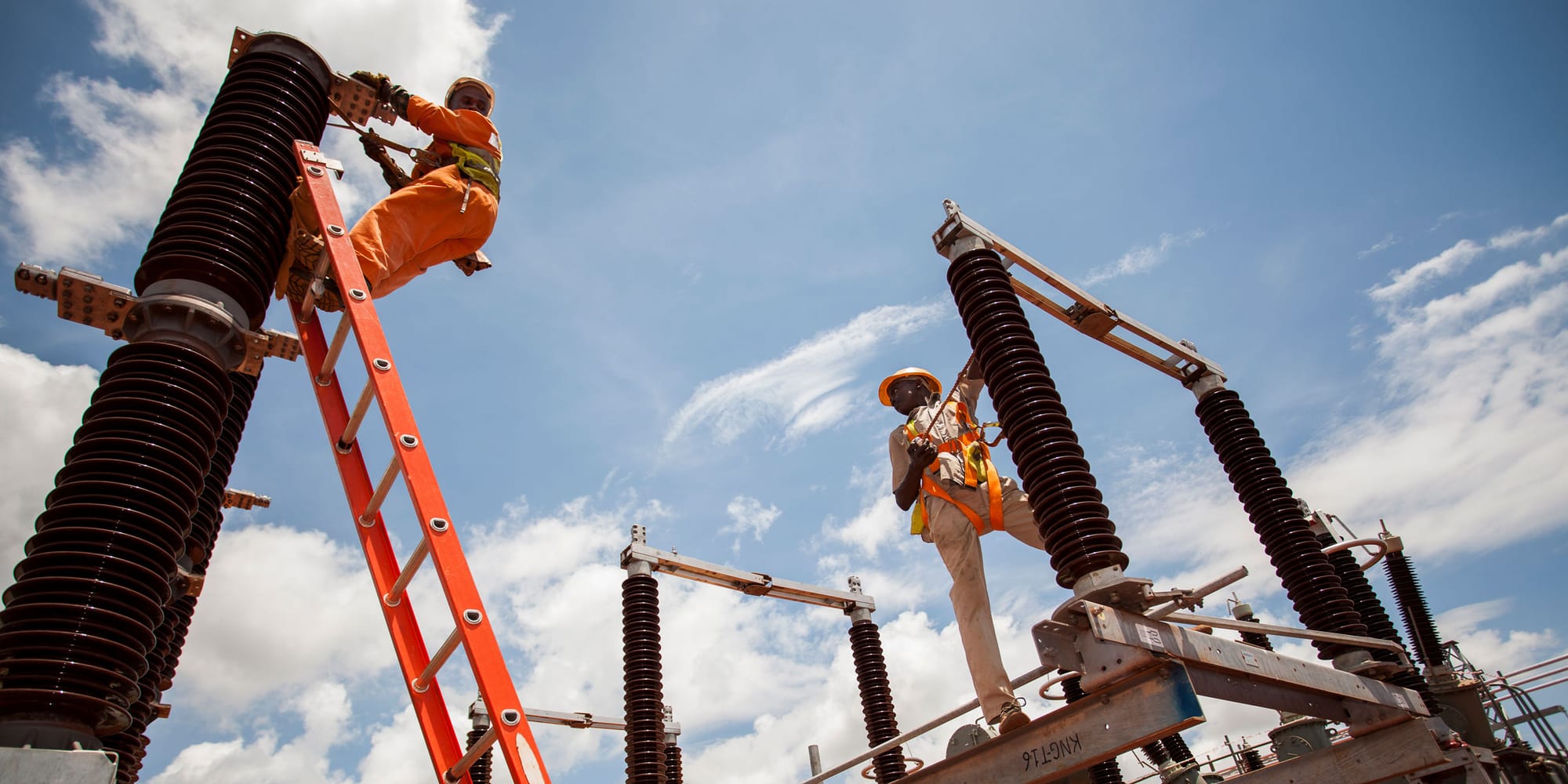
A new electricity transmission network across the border between Mali and Senegal has been completed, opening the door for a regional electricity market in Western Africa. 'The entire region is being transformed. There is now a stable electricity supply that has allowed our local economy to develop and thrive over the last four years.' World Bank
With little fanfare, the Biden administration is deploying $8 billion of infrastructure funding for pipelines and reservoirs in rural areas. The largest of these projects is the Arkansas Valley Conduit, a 130-mile-long pipeline to deliver melted snow from a reservoir in Denver to a dry valley in southeast Colorado. Grist
South Africa will become the first African country to introduce shared parental leave, after a landmark high court decision allowing parents to divide four months of leave between them. Previously, mothers were entitled to four months while partners were allowed 10 days. 'I think the new generation of men is taking on a more liberal stance. They want to be a core part of their children’s lives.' Guardian
More than 760,000 Venezuelan migrant women live in Peru. To support them, more than 3,000 community kitchens have sprung up in recent years, where Peruvian and Venezuelan women come together to provide food to those in need. 80% of the people receiving food are informal workers. World Bank
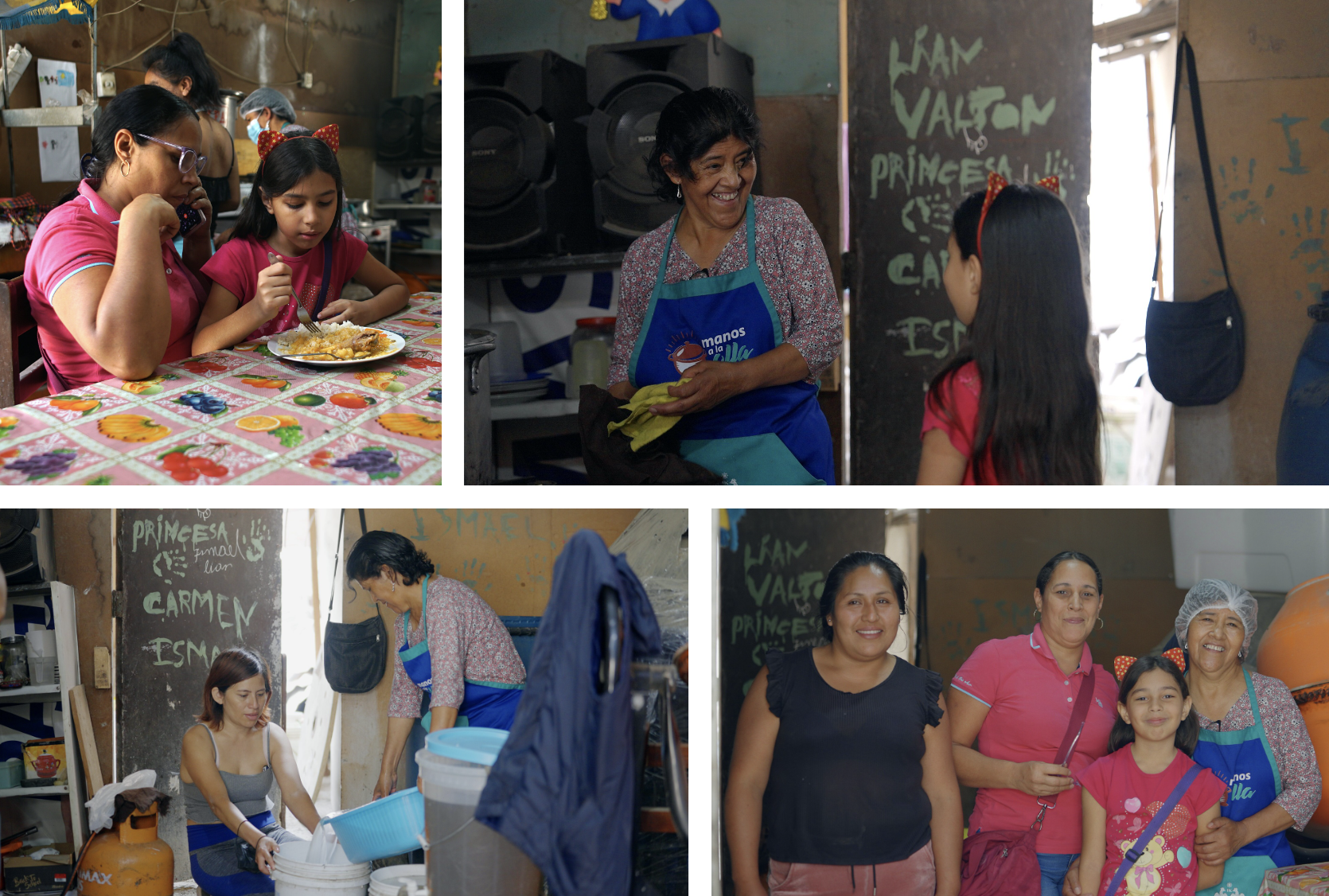
Fewer children in England have been having rotten teeth pulled out since the sugar tax on soft drinks began, prompting calls for the levy to be extended to sweets, biscuits, and cereals. The number of children aged 18 and under going into hospital to have teeth extracted has fallen by 12% since the sugar tax came into force in 2018. Guardian
An analysis of 5.8 million authors across all scientific disciplines shows that the gender gap in science is closing. Researchers found that men outnumbered women by 3.93 times among those authors who started publishing before 1992, but only 1.36 times among those authors who started publishing after 2011. Still a long way to go, especially among high-impact authors, but this is progress. PLOS
Bhutan celebrated the decriminalisation of homosexuality in 2021, allowing the LGTBQI+ community to feel seen, recognised, and included in a country where traditional values had earlier rendered them largely invisible. Activists now hope to capitalise on the momentum of the last few years by campaigning for marriage equality, legal gender recognition, and other crucial protections. Himal Mag
Thailand’s Cabinet has approved an amendment to its civil code to allow same-sex marriage. The law will guarantee same-sex couples the same rights as heterosexual couples, including the right to form a family and receive a pension. If approved by Parliament and endorsed by King Maha Vajiralongkorn, Thailand will become the third country in Asia, after Taiwan and Nepal, to allow same-sex marriage. AP

Give a damn
Meet our new charity partner, the Costa Rican Alliance for Sea Turtle Conservation and Science, a small nonprofit studying and protecting sea turtles in Costa Rica. They collect data on sea turtle activities, conduct nightly patrols to prevent poaching, engage in environmental outreach, and carry out capacity-building activities for local communities. Their co-founder, Christine Figgener, was a recent guest on our podcast.
We're sending them $6,000 to spend on a drone and two satellite transmitters. This will allow them to run aerial surveys over suspected sea turtle hotspots and follow individual turtles on their journeys via GPS. They're hoping to identify important sea turtle habitat and migration corridors, with the goal of advocating for further protections.
Thanks to all our paying subscribers for making this donation possible.
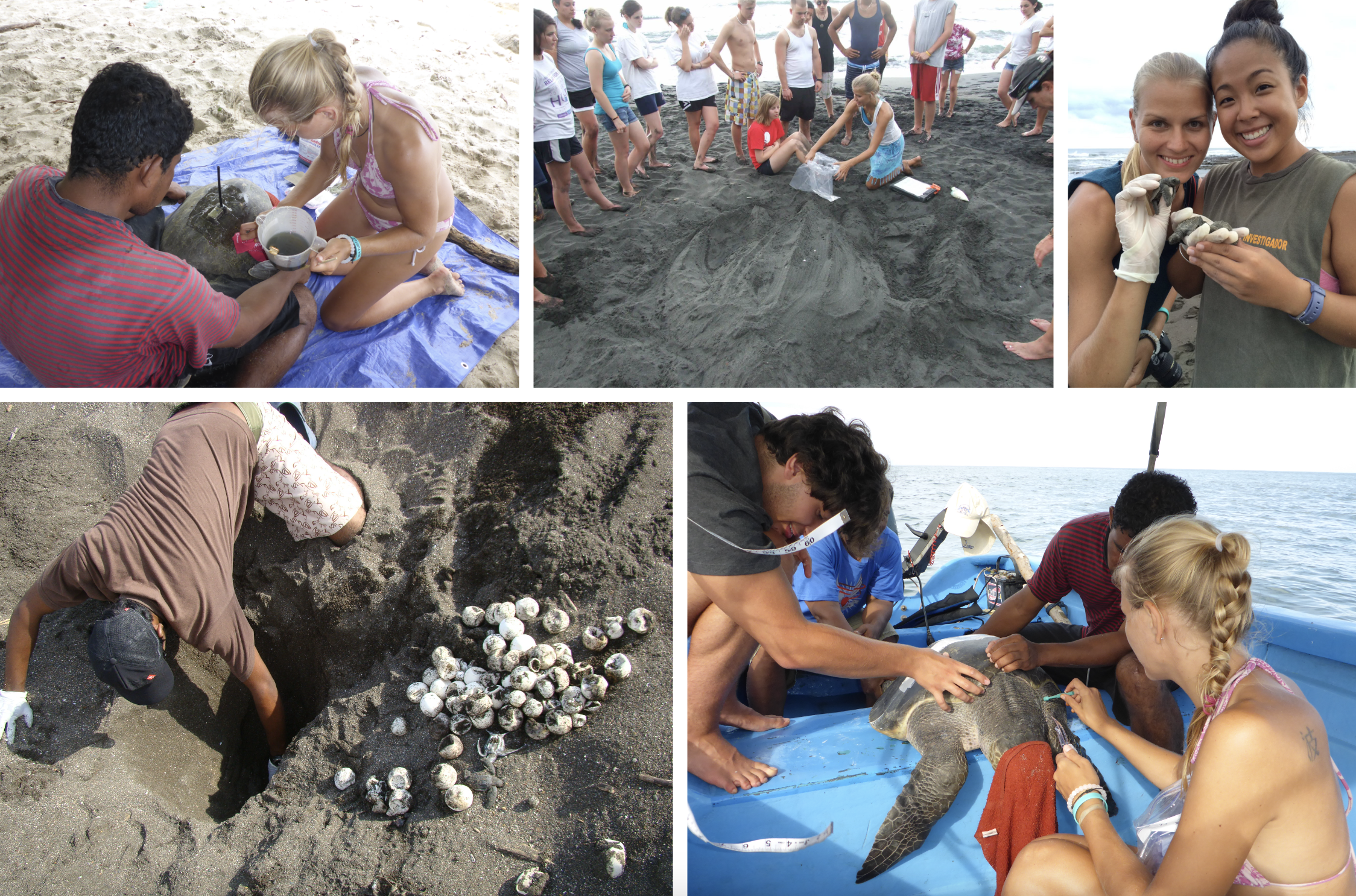
Also, we've received an update from the amazing folks at School for Life, whom our subscribers helped fund and distribute 2,500 reusable menstrual kits in schools in Uganda a few months ago.
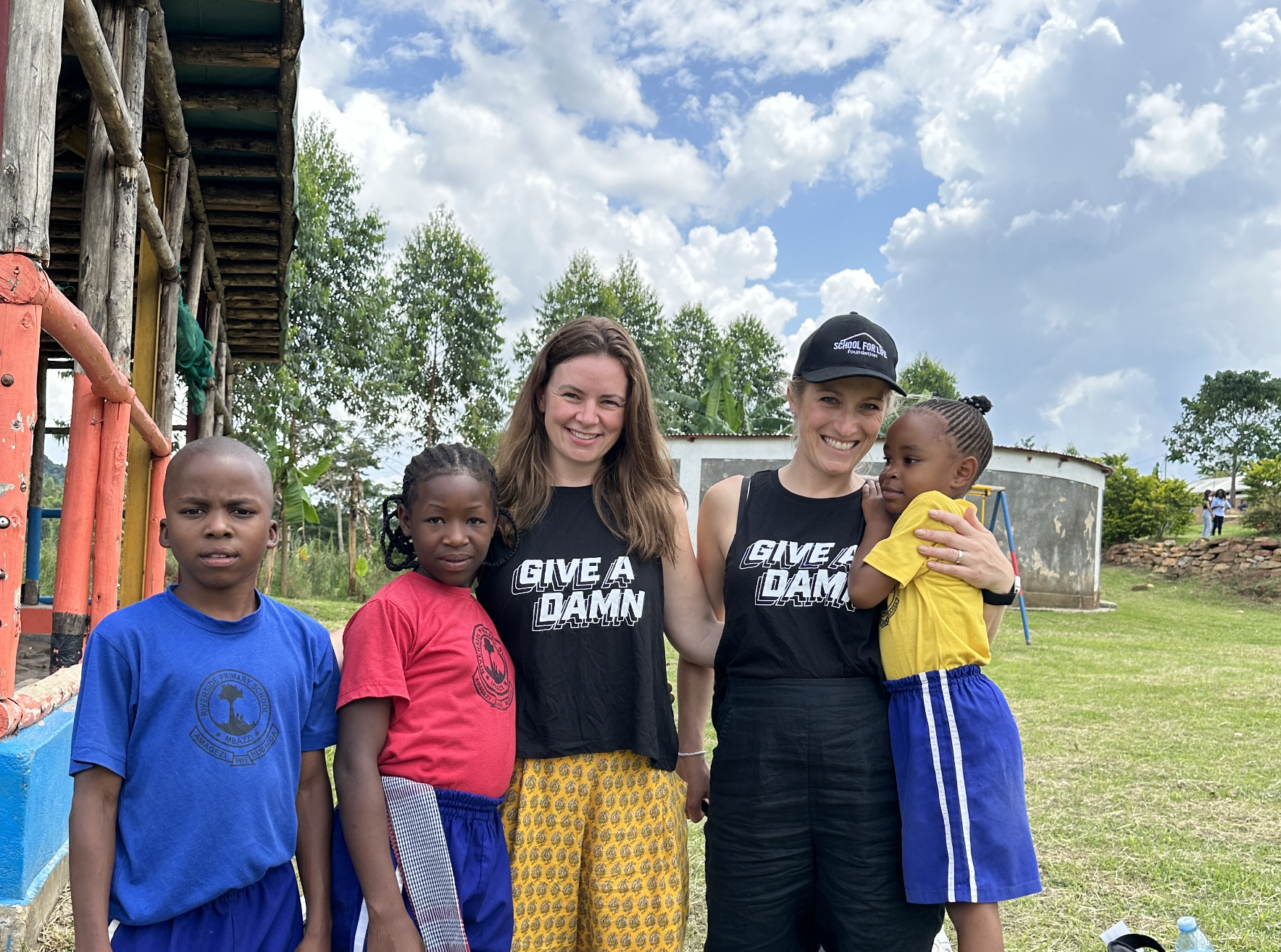
We're an independent media company, and 100% funded by our readers. There are no foundations, no investors, it's just us, and you. One third of all the subscriber fees we receive go straight to small charities who make a real difference, just like the ones we've profiled here. Plus, you get a whole lot of extra news about how the clean energy revolution is happening faster than anyone realises, jaw-dropping science stories, and so much more.
Good news for the planet
As thousands of premiers, potentates, and poseurs descend on Dubai for COP28, news outlets are reporting that the foxes in charge of the henhouse haven't been able to resist. So far, so predictable. Can we suggest getting rid of that fowl taste with this story about what's happening in China's deserts instead? We've turned on the gift link here, because it's one of the best pieces of graphical reporting we've ever seen. 🎁 Bloomberg
Out of the rolling yellow dunes of the Kubuqi desert arises what appears to be an oasis, shimmering blue beneath the northern China sky. Row after row of hundreds of solar panels cover this otherwise barren stretch of Inner Mongolia, about 500 km inland from Beijing. They’re the centerpiece of a clean energy project the size of 20 Central Parks that provides enough electricity for 1.1 million homes. The mammoth site is just one small piece of President Xi Jinping’s plan to deliver the largest ever deployment of man-made power capacity.
By the end of this decade, China aims to build the equivalent of 225 more of these massive renewables bases across vast swathes of the country’s interior. It’s a campaign that promises an upheaval across the energy sector: curbing China’s demand for fossil fuels, trimming its reliance on energy imports and steering the world’s biggest polluter toward a feasible path to zero out its greenhouse gas emissions.
Once complete, the renewables bases will total 455 GW of wind turbines and solar panels. That’s more clean energy generation capacity than is currently available in any nation outside China, and almost the size of the entire power network — including coal plants and nuclear reactors — in India, the world’s third-largest system. “It’s mind-blowing,” said Cosimo Ries, a Shanghai-based energy analyst with Trivium China. “There’s nothing in history you can benchmark this against."

Papua New Guinea will triple its area of protected ocean with two new MPAs spanning over 1.5 million hectares. It’s a huge win for critically endangered sharks, rays, and turtles, and for the 100+ Indigenous communities who spent seven years campaigning for the protections. WCS
The St Helena Marine Protected Area, one of the world’s largest MPAs, has been declared an International Marine Hope Spot. Covering 445,000 km2 of seamounts, canyons, and deep-sea habitats, it’s home to endangered species such as whale sharks, humpback whales, and several species of seabirds. Getaway
The newly-designated Yanuncay-Zhucay Municipal Conservation and Sustainable Use Area in Ecuador will protect the water supply for over 180,000 people in the nearby city of Cuenca. Covering 26,965 hectares of high-altitude grasslands and montane forests, the area will also protect Andean condors, hummingbirds, and several endangered amphibians. Andes Amazon Fund
It’s been an extraordinary month for nature protection in British Columbia, with a slew of unprecedented funding and legislative initiatives. The progress has marked a historic turning point in how the province prioritises Indigenous-led conservation. The Narwhal
- A $300 million conservation-financing fund for old-growth forest protection, to be administered by First Nations.
- A $700 million ‘Nature Agreement’ between federal and provincial governments and the First Nations Leadership Council.
- A draft of a Biodiversity and Ecosystem Health Framework to enforce the protection of biodiversity and ecosystem health over corporate profits.
- The Ḵwiḵwa̱sut'inux̱w Ha̱xwa’mis First Nation has designated a new 40,000-hectare protected area 'from mountaintop to seafloor' across Bond Sound and Thompson Sound.
The changes are so vast that 'nature protection' fails to capture the magnitude of events. What’s happening before our eyes is a whole-of-society restructuring. Think of it as a personal makeover for a region twice the size of France, trying to recover from the hangover of 150 years of colonial plunder.
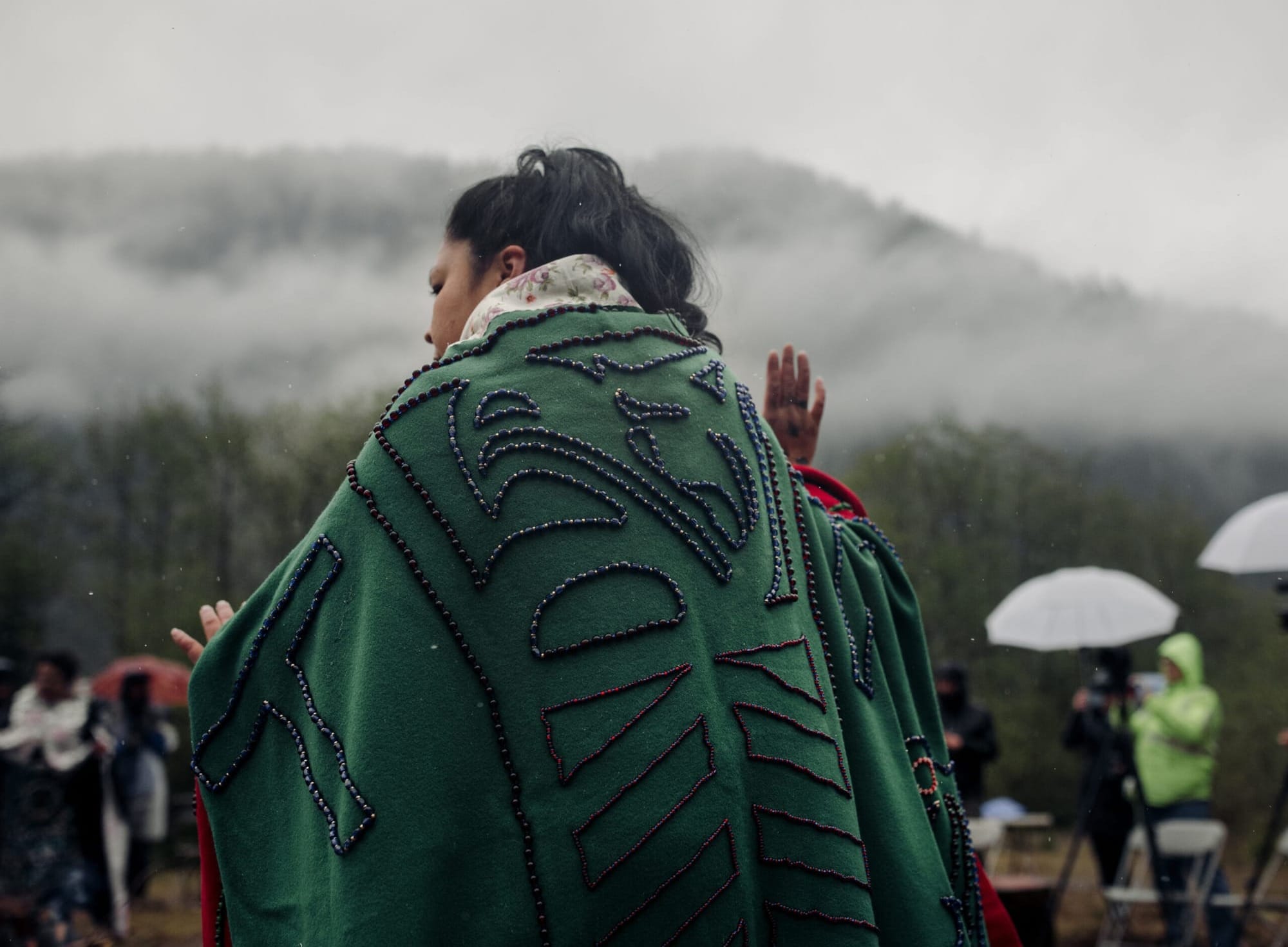
Local communities in Mexico have planted 2 million pine trees using a pre-Hispanic model called ‘forest rounds,’ which has ensured a 90% survival rate for the planted trees. In Rwanda the 'green hospital' initiative is aiming to plant 2 million trees around thousands of health centres across the country, and in Thailand 275,000 trees will be planted in the Kaeng Krachan National Park.
Oman has planted more than 3.5 million mangrove seeds as part of its Blue Carbon project, which aims to cultivate 100 million mangrove trees over four years. In Pakistan, a massive mangrove restoration project spanning an area nearly the size of Rhode Island is expected to absorb an estimated 142 million tons of carbon over the next 60 years.
Some of the world’s rarest birds are flying back from the edge of extinction—the Azores bullfinch has rebounded from 100 breeding pairs to over 1,300 individuals after 30 years of conservation efforts; the Bali myna has increased from 15 to 420 individuals; and rare seabirds are thriving on the shores of Lundy Island after a rodent eradication program.
If we can restore over 30,000 birds to one small island in the Bristol Channel, just imagine how much could be achieved if everyone came together to restore nature right across the United Kingdom?
Paul St Pierre, Royal Society for the Protection of Birds
After a decade of political wrangling, Olso has a new national park. Located on the doorstep of the city, Østmarka National Park will include existing recreational areas and protect around 71 square kilometres of nature. Life in Norway
Over the past decade, the Black Mambas, an all-female anti-poaching unit in South Africa, has eliminated rhino poaching in the Olifants West Nature Reserve, without the use of weapons. The group has made a significant impact on both local wildlife and the wider community, empowering women’s social standing and economic independence. BBC
More green shoots
Ottawa has banned keeping moneys and elephants in captivity as part of a series of laws to better protect animals in the country. The US state of Georgia is more than tripling its conservation lands around Amicalola Falls State Park. The Galapagos Islands are going green with a community-led transition of local food production, renewable energy, and 42 km of cycle paths. The EU and Canada have established a Green Alliance to collaborate on efforts to combat climate change. The island nation of Aruba has increased its protected wetlands with the extension of Spaans Lagoen from 70 to 14,408 hectares. Whoa. Canada has returned Middle Beach to the Pacheedaht First Nation; the Winnemem Wintu tribe in Northern California have purchased back 1,080 acres of their ancestral lands after years of restoring the winter-run Chinook salmon population; and in Oregon, the Klamath Tribes are raising suckerfish in ponds and returning them to the waters of the Sprague River. A collaboration between local communities and scientists in Borneo has brought the Kinabatangan River floodplain back to life. Even Fox News noticed the turtles in Florida! And do you want to see what happens when an orange juice company dumps 12,000 metric tons of orange peels in a national park and leaves it for a decade?

A bumper edition this week, if you made it all the way to the end well done :) Thanks again to all our paying subscribers for making the donation to COASTS possible, it really makes a difference.
We'll see you all next week, same time, same place.
With love,
Gus and Amy



